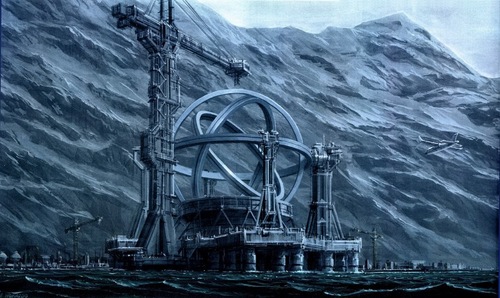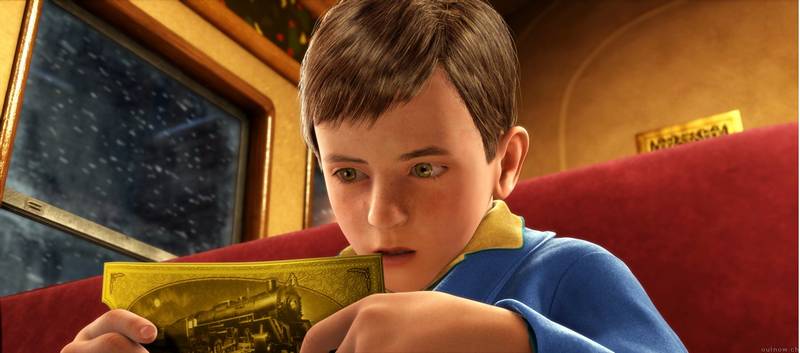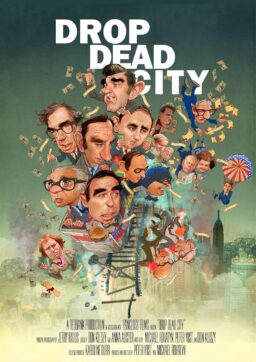
Spoilers abound.
I watched Robert Zemeckis’s “Contact” again a couple of weeks ago, so I could add it to the Great Movies Collection. In 1997 I had some questions, but this time it was even more clear that the movie ends in enigma and paradox. Like many movies, that has little bearing on its effect.
Questions introduced from near the beginning seem to find answers at the end, and most viewers are satisfied–even exhilarated. For me, too, there was uplift. No matter that the scientific establishment scoffs; Dr. Ellie Arroway (Jodie Foster) knows what she saw, and we saw the same things.
You will recall she is a radio astronomer involved in the Search for Extra-Terrestrial Intelligence (SETI). An evidently intelligent radio message is received from a planet circling Vega, the fifth brightest star in the night sky, about 25 light years away from Earth. It is flagged with prime numbers to grab attention. On decoding it, her team discovers a schematic plan for a space travel device, and the government funds construction of this machine for more than half a trillion dollars. (As you know, a mysterious tycoon funds a duplicate vehicle, as a backup.)
Nobody knows what will happen when the machine is activated. It is presumed that it will take a single human passenger on a voyage to meet the authors of the message. The first vehicle is sabotaged by a religious extremist (Jake Busey–is there something about the Busey family dentures that suggests extremism?). After several plot twists, the passenger in the backup spacecraft is Ellie Arroway. Trained as an astronaut, she enters a pod suspended above the vehicle, which looks like spinning tops within spinning tops. At its apogee the pod falls into its center, miraculously avoiding being hit by the spinning elements.

Here is what Ellie experiences, and we also see: She enters a tunnel of light, passes through something that loosely resembles the sound and light trip in “2001,” emerges under a strange sky on a strange beach, and sees a figure approaching her from the distance. This is her beloved father (David Morse), who in the movie told her, “If we are alone in the Universe, it sure seems like an awful waste of space.” Ellie’s mother died in childbirth, and as a child she asked her father if her mom was up there somewhere in the stars. As a professed atheist, Ellie has no belief in an afterlife, but this experience at least seems to indicate that her father seems to still exist in some way. Her entire trip appears to last about 18 hours.
Has Ellie visited Heaven? Or a planet circling Vega? On earth, it appeared that her pod fell directly into and through the spinning device in real time. A onboard video camera intended to show what she witnessed recorded only static. But: 18 hours of static. What objectively took seconds on Earth took 18 hours for Ellie subjectively and the camera objectively? Cameras cannot be subjective.
The planet is 25 light years away. A round trip at light speed would take 50 years (plus presumably 18 hours). Although recent news from the cutting edge of physics seems to indicate Einstein might have been mistaken in declaring light speed an absolute, when “Contact” was released in 1997 it was considered that way, not least by the author of the novel that inspired it, Carl Sagan. Presuming that Ellie seemed neither to herself or anyone else to be away for 50 years, we can assume that she did not travel to the distant planet.
Did she travel anywhere at all? Remember that the astronaut in “2001” found himself beyond Jupiter in a room that was arguably created by aliens for him from the contents of his own mind, to provide a familiar environment while they studied him. As a hypothesis I suggest that the beach and sky experienced by Ellie are likewise generated within her own mind. Her father is also produced from her wishes and memories, and what he tells her are her own hopes and thoughts, put into his mouth. The absence of her mother in this “afterlife” may possibly be explained by the fact that she has no memories of her. If the plot had the mother dying when Ellie was 6 or 12, it would have taken some explaining to account for her absence.
Another question occurs. When did the message picked up by SETI originate? Its content is a video transmission showing Hitler opening the 1936 Berlin Olympiad. (Did I say there would be spoilers?) This was the first TV transmission sent from Planet Earth, and could therefore be interpreted by an alien intelligence as a sign that our planet had reached a certain level of scientific sophistication. But there’s no reason to assume the Vegan message was sent by living aliens in 1936. It could have come from a device programmed to scan the Vegan skies for such transmissions, and bounce them back automatically. There’s no reason to assume the inhabitants of the Vegan planet are alive at this moment–or at any particular time in the past hundreds or thousands or millions of years. The sole function of their device appears to have been the generation of Ellie’s experience.

“All that we’ve found that makes the emptiness bearable,” her father tells her, “is each other.”
“What happens now?”
“You go home.”
In that case, half a trillion dollars seems to have been a lot of money for mankind to spend in order to find out what Ellie already knows. This question occurs to the panel that questions Ellie after her experience.
Panel member: Doctor Arroway, you come to us with no evidence, no record, no artifacts. Only a story that to put it mildly strains credibility. Over half a trillion dollars was spent, dozens of lives were lost. Are you really going to sit there and tell us we should just take this all… on faith?
[pause, Ellie looks at Palmer]
Michael Kitz: Please answer the question, doctor.
Ellie Arroway: Is it possible that it didn’t happen? Yes. As a scientist, I must concede that, I must volunteer that.
Michael Kitz: Wait a minute, let me get this straight. You admit that you have absolutely no physical evidence to back up your story.
Ellie Arroway: Yes.
Michael Kitz: You admit that you very well may have hallucinated this whole thing.
Ellie Arroway: Yes.
Michael Kitz: You admit that if you were in our position, you would respond with exactly the same degree of incredulity and skepticism!
Ellie Arroway: Yes!
Michael Kitz: [standing, angrily] Then why don’t you simply withdraw your testimony, and concede that this “journey to the center of the galaxy,” in fact, never took place!
Ellie Arroway: Because I can’t. I… had an experience… I can’t prove it, I can’t even explain it, but everything that I know as a human being, everything that I am, tells me that it was real! I was given something wonderful, something that changed me forever… A vision… of the universe, that tells us, undeniably, how tiny, and insignificant and how… rare, and precious we all are! A vision that tells us that we belong to something that is greater than ourselves, that we are not–that none of us–are alone! I wish… I… could share that… I wish, that everyone, if only for one… moment, could feel… that awe, and humility, and hope. But… That continues to be my wish.

End of quotes. What she finally discovered, I submit, is New Age woo-woo. Nothing that she (and we) experienced proves anything about how tiny and insignificant Man is in the Universe. We know that, because it is true, but what Ellie found was not fact but feeling. She might as well have been on an acid trip.
And yet, and yet–the SETI radio telescopes did indubitably intercept a signal from outer space. Nothing in the film leads us to suspect it was not from a planet circling Vega. The content of the signal was intelligently designed to attract attention with the prime numbers, and to respond with a 1936 video providing proof that our transmissions had been received. Then the Vegans sent the design of their cockamamie machine, which took Ellie on a journey to the center of her mind.
Do the 18 hours of static prove anything? Yes, I suppose they must. Please explain them to me.
“Contact” was at the time, and remains, an inspiring film, an expression of Carl Sagan’s hope that life and intelligence exists elsewhere in the universe. Some viewers interpret it as proof of an afterlife. By definition, wouldn’t an afterlife be as unprovable to the Vegans as it is for us? I believe the machine and Ellie’s experience prove only one thing: That she had those thoughts, and that the machine apparently had something to do with her thinking them. The member of the panel was correct. Half a trillion dollars was a big price tag.
And “Contact” is a fine film. If all movies had to withstand the test of logic, where would that leave us?

Postscript, 8:30 a.m. Dec. 29, 2011: Readers posting below assure me Ellie did indeed travel somewhere, through a wormhole. They say Sagan suggests that the father she meets is in fact an alien, who has taken a comforting and reassuring form. These scenarios offer a choice: (1) the alien race is alive at this time, (2) its machine, however ancient, was programmed to generate avatars that would comfort any visitor. There is a parallel here to the monoliths in “2001,” which in Arthur C. Clark’s short story were named Sentinels, and were of undetermined age (very old, since one was buried under countless years of Moon dust and residue).
Wormholes are mentioned in the film as Einstein-Rosen Bridges. They are consistent with the Theory of Relativity, but as a means of starting here, going to your destination and returning, they would seem to lack exactitude. Their greatest proven usefulness is as a deus ex machina in science fiction. Without them, the starship Enterprise couldn’t travel from one adventure to another but would be constantly en route.
The father-figure in “Contact” tells Ellie: “All that we’ve found that makes the emptiness bearable is each other.” What does that mean? It’s close to Sagan’s cherished hope that We Are Not Alone. Ellie has more questions, but her father assures her: “We will meet again.” Left in abeyance is why an actual wormhole journey was necessary. The original signal received by Ellie’s SETI project conveyed the same message: You Are Not Alone.
Yes, but what do we do then? I think it likely the universe contains countless intelligent beings–past, present and future. Given the distances involved, they will never meet. We’d better get cracking on those wormholes.
This video contains most of the material discussed above:











